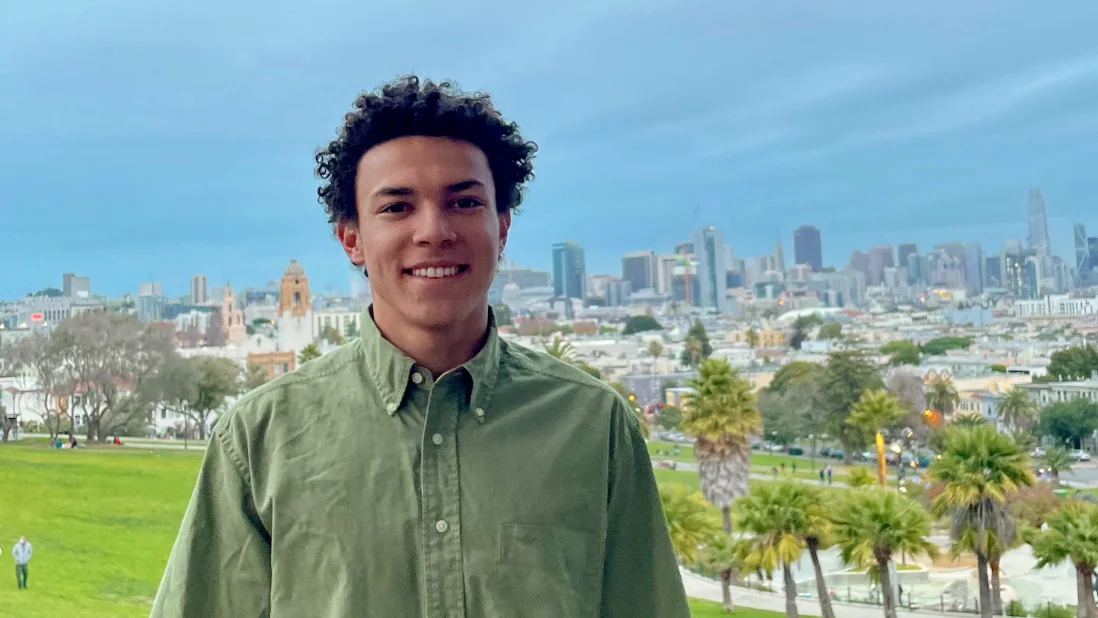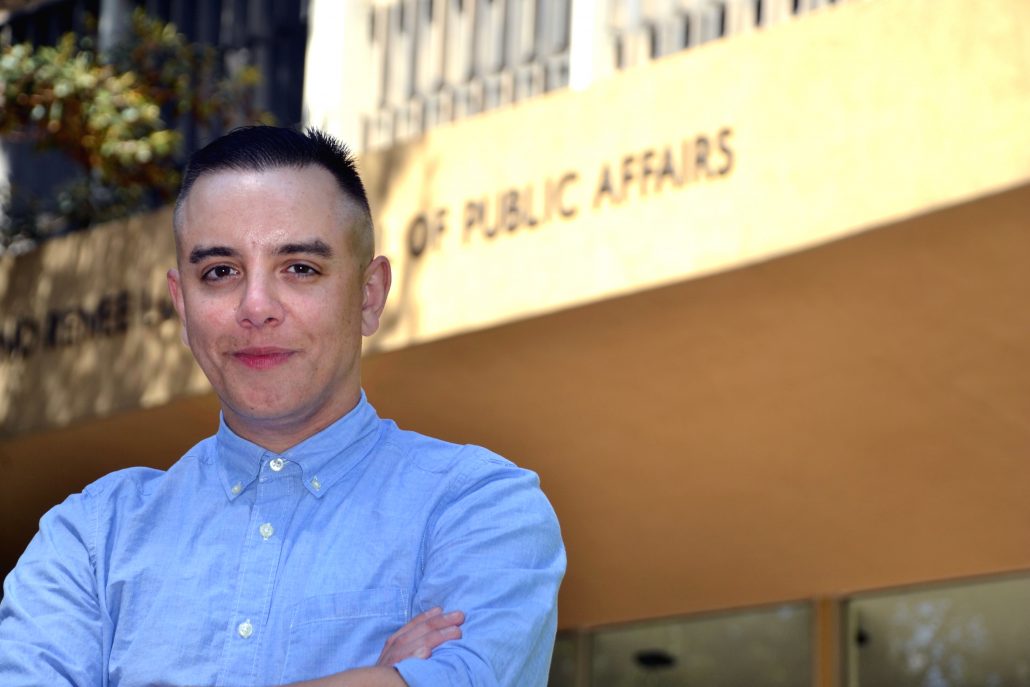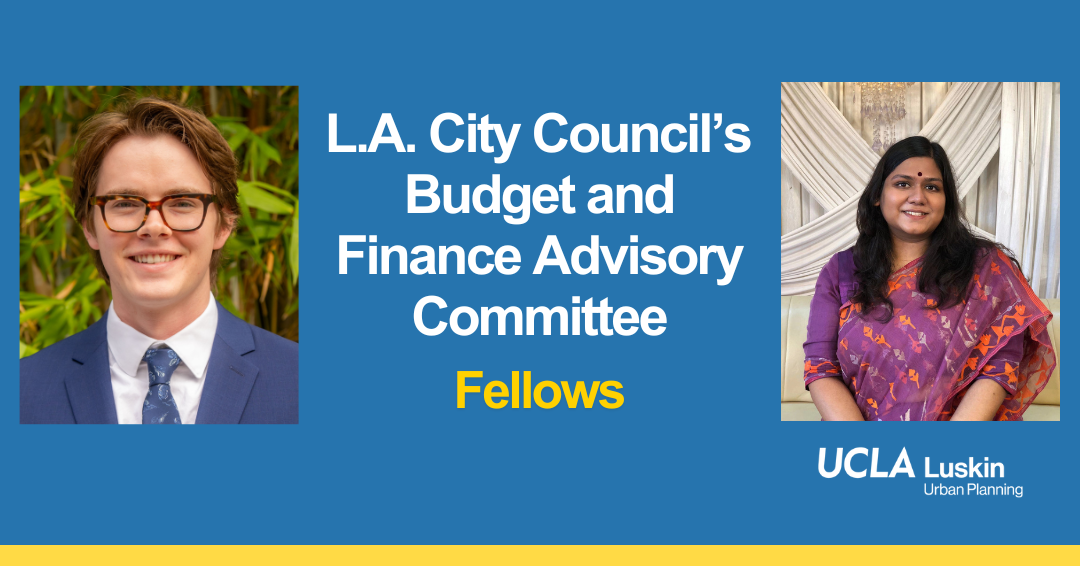UCLA student wins fourth consecutive national transportation prize Nick Giorgio’s award-winning analysis of traffic-calming treatments highlights how thoughtful street design can improve safety, equity, and livability in Los Angeles
UCLA graduate student Nick Giorgio MURP ’25 has been named a recipient of the Council of University Transportation Centers’ (CUTC) Neville A. Parker Award, marking the fourth consecutive year a UCLA student has earned the national honor. The award, presented Jan. 10 in Washington, D.C., recognizes outstanding master’s research in transportation, and Giorgio’s win brings UCLA’s total recipients to 15 since 2002.
“This award means a great deal to me, especially considering how strong many of the other capstone projects were,” Giorgio said. “It was a tough competition.”
Giorgio earned the recognition for his capstone project, Intersection Traffic Calming Treatments: A Comparative Analysis, which evaluated residential intersection improvements across Los Angeles in partnership with the Los Angeles Department of Transportation. Examining more than 30 intersections, Giorgio analyzed how all-way stop controls, traffic circles, and mini-roundabouts affect vehicle speeds and safety outcomes. His findings emphasize that context and design matter—and that no single solution fits every neighborhood.
“Roads are the largest share of public space in Los Angeles, and how we design them reflects our values,” Giorgio said, underscoring the link between traffic safety, equity, and livability.
Faculty advisor Brian Taylor praised the work’s practical impact, noting, “Nick’s analysis brings much-needed clarity to the question of what types of intersection treatments actually make neighborhoods safer.”
Read the full Institutes for Transportation Studies article on UCLA student Nick Giorgio’s national transportation award.
U.S. Inequality Through the Housing Lens: A Conversation with José Loya How race and policy continue to shape access to homeownership
by Peaches Chung
Homeownership is often framed as the American dream. For José Loya, it is also one of the clearest windows into how inequality is reproduced in American society. As an assistant professor of urban planning at UCLA Luskin, Loya examines how race, ethnicity, and structural inequities shape who has access to opportunity — and who doesn’t.
Loya’s interest in housing was sparked as an undergraduate at Brown University during the Great Recession, when countless families faced foreclosure.
“I was trying to understand why people were going into foreclosure and potentially losing everything,” he recalls. Working with a faculty mentor who specialized in homelessness and housing instability, he encountered the question that has guided his research ever since: How do we explain, and ultimately address, racial and economic inequality in the housing market?
Loya describes himself as a social stratification scholar. The patterns he uncovers aren’t new, discrimination in mortgage lending has been proven for decades, but his methods are.
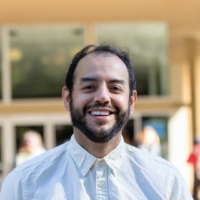
Professor José Loya
“I’m using modern statistical tools and richer, more comprehensive datasets than previous generations of researchers had,” he explains. “The findings may not be surprising — that whites and Asians tend to be the most advantaged in the mortgage market — but the nuance is different. I can show how inequality persists today, not necessarily in the same form as 50 or 70 years ago, but still present.”
Much of his recent work examines barriers that prospective homebuyers face in the post–Great Recession era, as well as the ways Latino subgroups experience the mortgage market differently. Traditional research often treats Latinos as a homogenous category, something Loya argues conceals important differences.
“Latinos are an ethnic group, not a racial group. There is tremendous diversity,” he says. “By drilling down into subgroups, we start to see how different racialized experiences among Latinos shape their access to homeownership.”
A Wealth-Building Tool That’s Slipping Out of Reach for Many
Homeownership remains the single largest vehicle for building wealth in the United States. But Loya’s research shows that the tool is becoming increasingly out of reach for the very communities who could benefit from it most.
“In the last decade and a half, home prices have grown much faster than wages or any measure of labor success,” he says. “Middle-class and lower-income families are being squeezed out.”
Add in rising interest rates, limited housing inventory, and skyrocketing demand, and a central question emerges: If homeownership is no longer accessible, how do families achieve upward mobility?
Loya points to a paradox at the heart of U.S. housing policy. “Our banks want you to be a homeowner. The tax system incentivizes it through the mortgage interest deduction, one of the largest subsidies in the U.S. tax code. But the financial risk is growing and making it less achievable for lower and moderate-income households. Today, those subsidies are being largely utilized by higher socioeconomic households.”
According to recent data, the homeownership rate for non-Hispanic white households sits around 73–74%, while Black households own homes at roughly 45–46%, and Hispanic/Latino households at about 50–51%. “Progress has been made,” Loya says. “But the gap is nowhere near closed.”
Why Research Matters Now More Than Ever
For Loya, UCLA Luskin offers the ideal environment to confront these challenges because the school engages students in opportunities for intersectional learning, bringing together perspectives from multiple specialties to tackle social, economic, and environmental challenges.
“Society doesn’t operate in silos,” he says. “If we’re talking about access to homeownership, we’re also talking about labor market insecurity, education access, local zoning, transportation, climate change — all of it.”
“Good research doesn’t always give you an answer. It shows you how much more work is needed to get to an answer.”
At a time when federal research funding faces threats and universities nationwide are navigating political pressures, Loya is direct about why research still matters.
“Universities don’t just study the problems of today,” he says. “We’re trying to anticipate the problems 20 or 30 years from now.”
His own work, he says, is less about providing immediate fixes and more about documenting how historical patterns of inequality still shape outcomes today — and will continue to shape them in the future if left unaddressed.
Preparing Students for Real-World Challenges
When asked what he hopes his students take away from his classes, his answer is clear but hard to explain.
“Problems are complicated,” he says. “Good research doesn’t always give you an answer. It shows you how much more work is needed to get to an answer.”
Rather than rushing toward solutions, Loya encourages students to sit with uncertainty and ask better questions about the systems shaping outcomes. “In my classes, it’s not necessarily about finding the solution,” he adds. “It’s really about understanding the problem.”
For Loya, that’s often where the work begins — with examining the forces that are often hidden in plain sight — and equipping students with the tools to question them.
Oil and Gas Companies Sacrificing Plastic-Burdened Communities
The UCLA Luskin Center for Innovation has released a new report examining the links between plastics, fossil fuels and inequitable exposure to environmental hazards. Titled “What Defines a Plastic-Burdened Community? — Part II,” the report is authored by Veronica Herrera and Daniel Coffee.
The analysis highlights how communities located near refinery infrastructure face disproportionate exposure to pollution, despite California’s reputation for climate leadership. Emissions from fossil fuel drilling and refining have been linked to respiratory and cardiovascular disease, adverse birth outcomes and increased cancer risk. These impacts fall most heavily on Latino and Black residents, who are more likely to live in neighborhoods closest to refineries.
The report also points to the Plastic Pollution Mitigation Fund established under Senate Bill 54 as a potential tool to reduce health harms and prevent plastic-burdened communities from being treated as sacrifice zones.
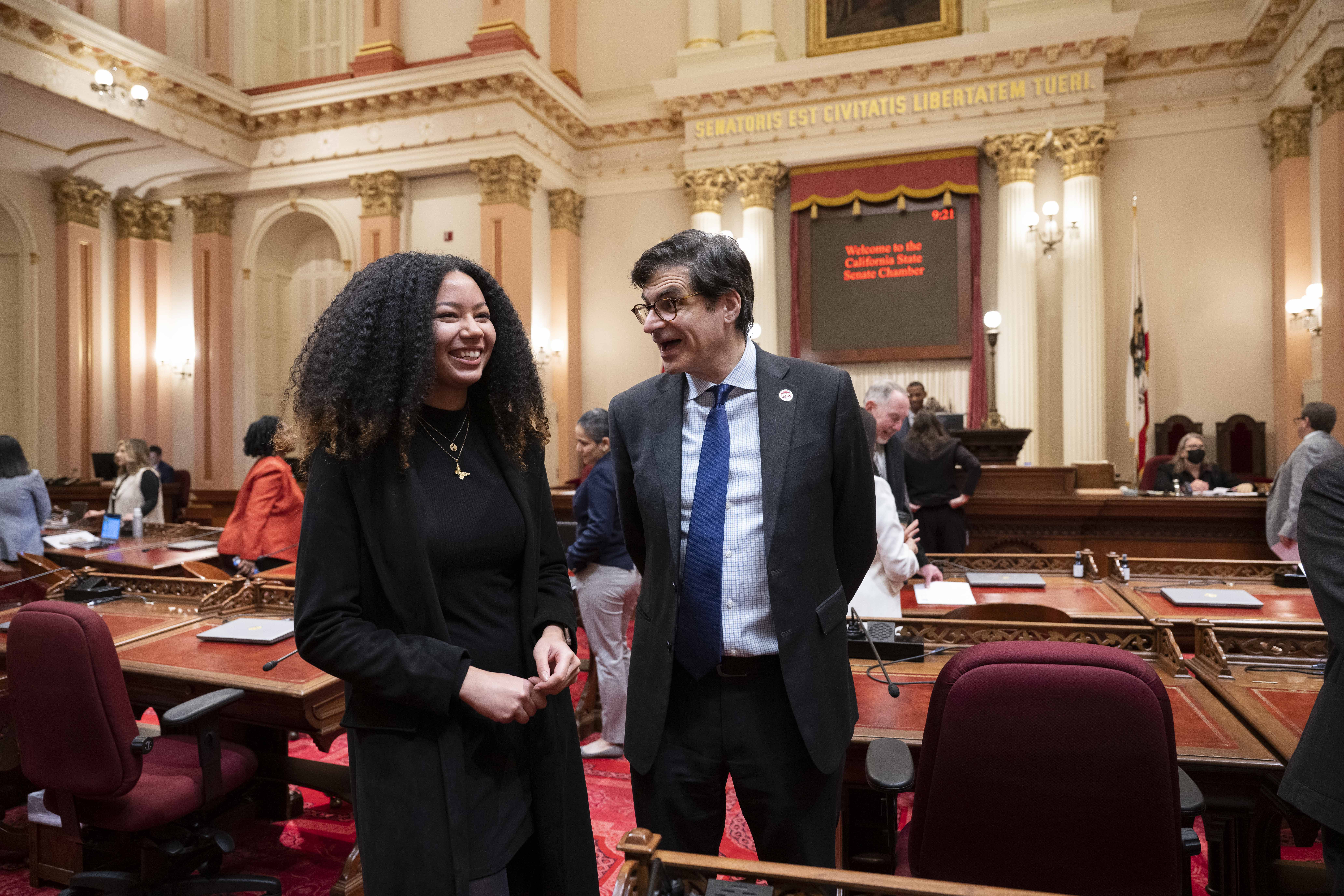
A sixth-generation Altadena resident presents a community recovery roadmap after the fires Sam James and the Altadena Recovery Team meet survivors’ needs and push for policy-informed advocacy
by Peaches Chung
For Samantha “Sam” James, fire recovery and equitable rebuilding isn’t just a policy debate; it’s the reality of the community she and her family have called home for six generations.
The Eaton Fire destroyed homes across her entire extended family, including part of her own childhood home. James, a first-year master’s candidate in public policy at the UCLA Luskin School of Public Affairs, channeled her grief into action, transforming her family’s loss into a blueprint for community-driven advocacy.
It started with one simple text message to a group chat.
“I said I was going to Costco to buy hygiene supplies and asked if anyone wanted to help distribute them,” she said. That small idea turned into a full-scale supply distribution event on her cousin’s front lawn. This sparked a group effort that laid the foundation for the Altadena Recovery Team, which the founders describe as a collective of four Black women who were born and raised in the Altadena and Pasadena area, and now work to restore the spirit of their community.

Courtesy of Sam James Clockwise, from top left: ART Chief Operations Officer Savannah Bradley, CEO Sam James, Chief Wellness Officer Makai Ward and Chief Impact Officer Allison Moore.
“We were devastated and feeling helpless,” she said. “Being able to have a place to channel that energy that was productive, and help channel that rage, it was truly healing.”
James co-founded ART, which centers the financial, physical and mental well-being of fire survivors through distribution drives, healing spaces and on-the-ground support. As ART’s CEO, she drives grant and fundraising strategies and ensures the organization’s programs are trauma-informed and community led. Policy conversations with partners at the state level — on issues ranging from rebuilding and long-term displacement support to mental health access — are grounded in her own experience as a community member impacted by the Eaton Fire. Her commitment makes one thing clear: When communities drive their own recovery, healing is possible.
After graduating from UCLA in 2021 with a bachelor’s degree in political science, James came back in 2025 to UCLA’s MPP program with a clear purpose. After completing the highly competitive California Senate Fellowship, where she worked in state Sen. Josh Becker’s office on criminal justice reform, James went on to serve as a community engagement manager for Rising Communities, a nonprofit that works to eliminate disparities in health and social welfare in South Los Angeles. There, she trained the Los Angeles County Department of Public Health on inclusive, trauma-informed community engagement practices and worked on reform initiatives grounded in equity and justice.
“Everything I had learned was on the job,” she said. “I wanted the research background, the theoretical understanding that the MPP offered. Being back on campus has been incredible. I graduated during the pandemic, so returning now and sharing space with my cohort has been deeply meaningful.”
At UCLA, James is also a graduate student researcher with the Black Policy Project in the Ralph J. Bunche Center for African American Studies. Her research focuses on whether landlords are following the law and giving formerly incarcerated tenants a fair and lawful screening process. She also serves as the first-year representative for the Public Policy Leadership Association, strengthening student advocacy and community within the program.
She had no idea that a bill she helped draft in Becker’s office would one day directly affect her own family. James helped advance SB 1008, the Keep Families Connected Act, which made phone calls free for incarcerated people and their families. At the time, California’s prison telecom industry was worth $1.4 billion, and more than one in three families were being pushed into debt just to stay connected with incarcerated loved ones.
Years later, now with a family member experiencing incarceration, her own family is benefiting from the policy she helped pass. Seeing that impact up close reinforced her belief in community-centered policy and fueled her decision to pursue her master’s at the Luskin School.
“It was incredible to have that full-circle moment,” she says. “It showed me what’s possible when we push against the systems that keep people down in the incarceration space. It confirmed that criminal justice policy is where I want to be. After Luskin, I want to keep driving that change forward, especially as California continues to lead the way.”
James’ story recently reached a broader audience through TEDxAltadena, where she delivered a message about the unprecedented tragedies that have shaped Gen Z, and the powerful way her generation has transformed that collective rage into action.
“We’ve experienced tragedy after tragedy — 9/11, mass shootings, climate disasters, the pandemic, a mental-health crisis,” she said. “But we’re channeling that frustration into resilience and action.”
Her talk also spotlighted the origins of the Altadena Recovery Team, founded by James, Savannah Bradley, Allison Moore and Makai Ward. Together, they coordinated donations, distributed supplies, started yoga and meditation programs and pushed policy reforms, including support for mortgage relief legislation that Gov. Gavin Newsom signed into law in September. They also raised nearly $400,000 through crowdfunding and grants. James framed ART as both a recovery model and a preview of what future climate disasters will demand: localized leadership, shared power, culturally competent support and policy-informed advocacy that ensures longtime residents aren’t pushed out of the neighborhoods they helped build.
“What we know is that climate disasters are only going to intensify,” she said. “We want ART to become a resource for other communities — offering mentorship, seed funding and a roadmap so they can lead their own recovery.”
James’ advice for anyone feeling overwhelmed by the state of the world mirrors the ethos she lives by today.
“Breathe. Take space for yourself. You can only show up for others if you’re showing up for yourself,” she said. “Then get involved. Being on the ground with my community has been profoundly healing. Being in community rarely makes things worse — it almost always makes things better.”
Rooted in her love and care for her community, she is turning her rage, as she puts it, “straight into power.” And she’s just getting started.
Carlos E. Santos Elected President of National Social Work Educators Association Luskin faculty member to lead the Association of Latina/o Social Work Educators
UCLA Luskin Associate Professor of Social Welfare Carlos E. Santos has been elected president of the Association of Latina/o Social Work Educators (ALLSWE), a national organization dedicated to advancing teaching, scholarship, and leadership in social work and social welfare.
“Being elected president of ALLSWE is a profound honor, both personally and professionally,” said Santos. “Personally, it affirms the importance of community, solidarity, and shared purpose among Latin American-origin (LAO) social work educators, especially at a time when many of us, and those in our communities, are navigating significant professional, political, and social challenges. Professionally, it represents a responsibility to steward an organization that has long served as a critical intellectual home for LAO social work educators. I am deeply grateful for the trust placed in me and committed to honoring the legacy of ALLSWE while helping it evolve to meet the needs of our diverse and growing community.”
As president, Santos aims to expand ALLSWE’s reach to educators both within and outside the U.S. and strengthen it as a space of support and community. “I hope ALLSWE remains responsive to the evolving needs of LAO communities, advancing scholarship, teaching, and practice that promote equity, dignity, and collective well-being,” he added.
Santos is widely recognized for his intersectional research on how overlapping systems of oppression shape mental health, educational outcomes, and civic engagement, particularly among queer Latinx youth. His work bridges developmental psychology, social welfare, and public policy, with a strong emphasis on translating research into practice.
Golden Bachelder and Prokriti Monolina: Fellows on the First Budget and Finance Advisory Committee
by Jiah Lee
The L.A. City Council’s Budget and Finance Advisory Committee met for the first time this November with the goal of tackling structural financial issues and shifting towards more long-term budget planning by introducing outside expertise. The creation of this committee was proposed by Los Angeles City Council member Katy Yaroslavsky, who now serves as its chair.
Two UCLA graduate students, Golden Bachelder and Prokriti Monolina, are currently serving as fellows on this committee. Bachelder is a second-year Master of Public Policy (MPP) student and Monolina is a second-year Master of Urban and Regional Planning (MURP) student at the UCLA Luskin School of Public Affairs. Bachelder and Monolina are both fellows in the Office of Councilwoman Yaroslavsky.
“It is an honor being able to help with the Budget and Finance Advisory Committee,” said Bachelder. “As one of the graduate student fellows, I am able to work with inspiring Los Angeles leaders and public servants in the effort to put Los Angeles in the best possible fiscal footing. I’m grateful for the opportunity to be able to help a cause that could benefit the city and its people for years to come.”
Monolina also shared her experiences with the committee. “As a UCLA Luskin Leadership Fellow, I am committed to supporting the Budget and Finance Advisory Committee (BFAC) in reimagining Los Angeles’s resources through rigorous policy analysis and targeted research in municipal finance and resource allocation. This work also involves in-depth research in real estate development, land use strategy, and the development of sound financial policy frameworks. It’s an incredible opportunity to work alongside experts and learn from them. One day, I hope to bring these insights to Bangladesh, my motherland,” she said.
Outside of the committee, Bachelder and Monolina continue to make a positive impact on policy reform and the future of their communities. Bachelder served as a fellow in the Office of California Governor Gavin Newsom where he worked to promote shared goals through research on initiatives, and Monolina is a waste researcher who founded an app called Eco360 that promotes green consumerism.

